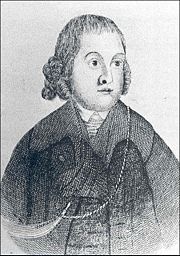Benjamin Church was born in 1639 in Plymouth Colony. He was a military leader of the historic predecessor of the United States Army Rangers and captain of the first Ranger force in America. Church was commissioned by Josiah Winslow, the Governor of the Plymouth Colony, to form the first ranger company for King Philip's War. He later commanded the company to raid Acadia during King William's and Queen Anne's wars in the early 1700s.

Early Life
Benjamin Church was born in Plymouth Colony and grew up on the frontier. At an early age, he knew how to hunt, trap, and do what was necessary to survive in Colonial America. He married Alice Southworth in 1667 and resided in Duxbury, Massachusetts, before moving to Bristol and then Little Compton, Rhode Island.
Throughout his life, he learned how to interact with the natives that lived in America. He also learned their battle tactics and began to modify them.
Military Expeditions
King Philip's War: Benjamin Church was the principal military aide to Governor Josiah Winslow of Plymouth Colony. Commissioned by Winslow as a captain on July 24, 1675, he fought during King Philip's War on the New England frontier against the Wampanoag, Nipmuck, and Podunk tribes of Indians. He is best known during this time for commanding a company of Englishmen and Native Americans independently of the governor's direction. Church's men were the first colonial force to be successful in raiding the hostile Indians' camps in forests and swamps. During previous decades, colonists had been on the defense against the Natives, who knew their territory intimately. Relations were generally peaceful until 1675, but tensions had been growing as the colonists and their views of property encroached on Indian territory and hunting grounds.
Church was allowed to recruit Native Americans after he and other leaders realized that traditional European military tactics were ineffective in frontier warfare. He also persuaded many neutral or formerly hostile Indians to surrender and join his unit, where they operated skillfully as irregular troops. Some of these men had converted to Christianity in settlements before the war. They were known as Praying Indians. After being organized by the Church, these troops tracked hostile Indians into the forests and swamps and conducted effective raids and ambushes on their camps.
Great Swamp Fight: Church was wounded in the battle, but his forces fought masterfully. The battle crippled the native forces. After the battle, an Indian ally of his shot and killed Metacomet (King Philip) and brought the war to an end.
King William's War: Church led four New England raiding parties into Acadia (which included most of Maine) against the ethnic French Acadians and hostile Native Americans, including the Abenaki. His raids were very successful in crippling native forces, defending colonists, and rescuing prisoners. His tactics were advanced, and his troops were well-trained in guerilla-style warfare.
Queen Anne's War: On March 18, 1704, Church was commissioned as a colonel by Massachusetts Governor Joseph Dudley and placed in command of a force to raid French settlements in Acadia in retaliation for the Deerfield Massacre. This expedition included the following actions: the Raid on Castine, Maine, the Raid on St. Stephen, New Brunswick, the Raid on Grand Pre, the Raid on Pisiguit, and the Raid on Chignecto.
Church meticulously planned the expedition. He specified the design of whaleboats to be used in the raids and what kind of hatchets his soldiers were to carry. Church took John Gyles, formerly held as a captive by the Maliseet, as his translator. The church took prisoners and claimed to have left only five houses standing in Acadia. In the Raid of Pisiguit, he took the leader Noel Doiron as a prisoner.
Benjamin Church Tactics
While there is no formal organization of Church's tactics, scholars have pieced together his memoirs and come up with the following:
- Planning each operation in advance, not leaving anything to chance.
- Ensuring that soldiers under his command were properly trained, fed, and equipped.
- Building alliances with potential allies (i.e. Native Americans), who may have been overlooked or mistrusted by other commanders.
- Not inflicting unnecessary damage or harm.
- Using stealth and surprise to tactical advantage.
- Understanding how a tactical operation fits in with strategic objectives.
- Leading by example and from the front.
- Maintaining communications with higher and lower echelons.
Death and Family
Benjamin Church died in 1718 in Little Compton.
Church kept notes on his tactics and operations in 1675-1676. His work was eventually published in 1716 as Entertaining Passages relating to Philip's War. Church was the great-grandfather of Dr. Benjamin Church, the first "Surgeon General" of the Continental Army. Dr. Church, thought to have been a staunch Whig, was later arrested by General George Washington as a suspected spy for British General Thomas Gage.
Rogers Rangers and Gorham's Rangers were militia developed according to the tradition begun by the Church.
